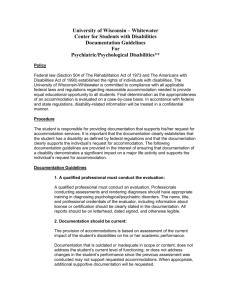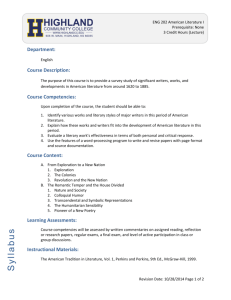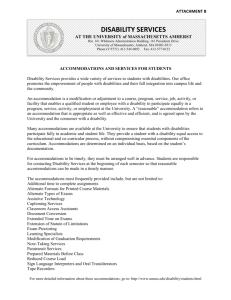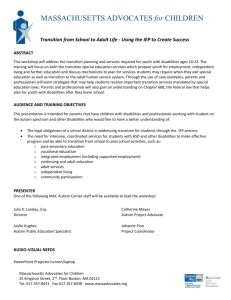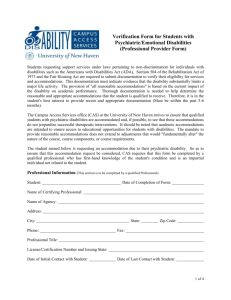Pervasive Developmental Disorders
advertisement
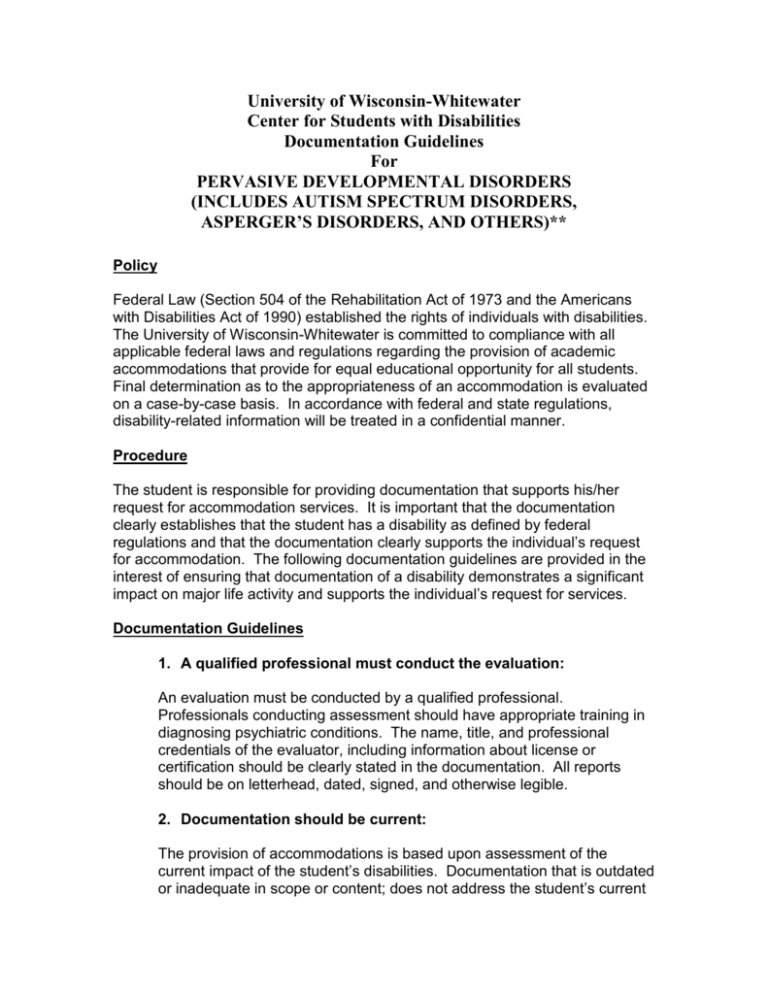
University of Wisconsin-Whitewater Center for Students with Disabilities Documentation Guidelines For PERVASIVE DEVELOPMENTAL DISORDERS (INCLUDES AUTISM SPECTRUM DISORDERS, ASPERGER’S DISORDERS, AND OTHERS)** Policy Federal Law (Section 504 of the Rehabilitation Act of 1973 and the Americans with Disabilities Act of 1990) established the rights of individuals with disabilities. The University of Wisconsin-Whitewater is committed to compliance with all applicable federal laws and regulations regarding the provision of academic accommodations that provide for equal educational opportunity for all students. Final determination as to the appropriateness of an accommodation is evaluated on a case-by-case basis. In accordance with federal and state regulations, disability-related information will be treated in a confidential manner. Procedure The student is responsible for providing documentation that supports his/her request for accommodation services. It is important that the documentation clearly establishes that the student has a disability as defined by federal regulations and that the documentation clearly supports the individual’s request for accommodation. The following documentation guidelines are provided in the interest of ensuring that documentation of a disability demonstrates a significant impact on major life activity and supports the individual’s request for services. Documentation Guidelines 1. A qualified professional must conduct the evaluation: An evaluation must be conducted by a qualified professional. Professionals conducting assessment should have appropriate training in diagnosing psychiatric conditions. The name, title, and professional credentials of the evaluator, including information about license or certification should be clearly stated in the documentation. All reports should be on letterhead, dated, signed, and otherwise legible. 2. Documentation should be current: The provision of accommodations is based upon assessment of the current impact of the student’s disabilities. Documentation that is outdated or inadequate in scope or content; does not address the student’s current level of functioning; or does not address changes in the student’s performance since the previous assessment was conducted may not support requested accommodations. When appropriate, additional supportive documentation will be requested. 3. Documentation necessary to substantiate a disability should include: A specific diagnosis that conforms to DSM-IV (Diagnostic and Statistical Manual of Mental Disorders, 4th Edition). A criteria for Autism, Asperger’s Syndrome, or Pervasive Developmental Disorder – Not Otherwise Specified. Current functional limitations on major life activities resulting from the Autism spectrum disorder to include but not be limited to: communication or language skills, social interaction, restricted, repetitive and/or stereotyped patterns of behavior and activities, sensory functioning and sensitivity to environmental conditions, and motor planning. Evidence to support the function limitations this statement may include aptitude testing, standardized tests of language skills, clinical and teacher observations, and standardized scales of symptoms related to autism. Recommendations for accommodations related to function and their rationale should be stated and any other strategies or services that may benefit the individual in a higher education environment. 4. Qualified Professionals include: Psychologist, Licensed Clinical Psychologists, Neuropsychologists, Psychiatrists and other relevantly trained medical doctors. **These guidelines are not meant to be used exclusively or as a replacement for direct communication with the Center for Students with Disabilities regarding the individual nature of a disability. While submitted documentation meeting the above guidelines may be acceptable to the University of Wisconsin-Whitewater it is important to be mindful that they may/may not meet the documentation guidelines required in other academic or testing organizations.
